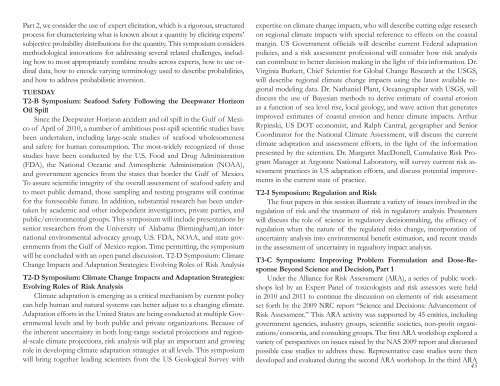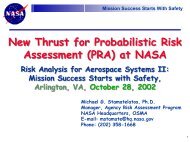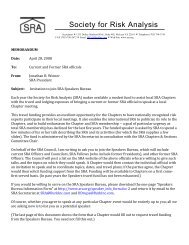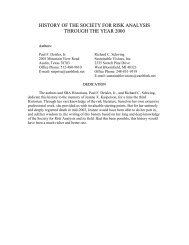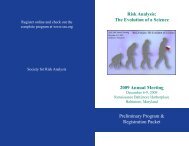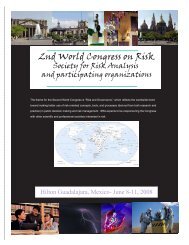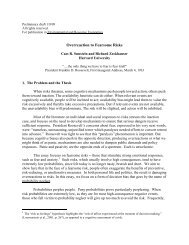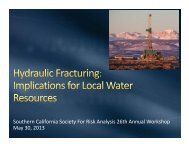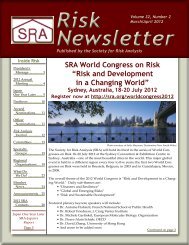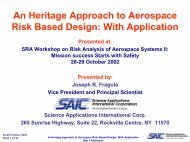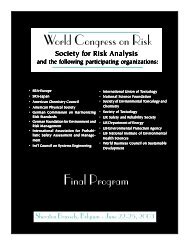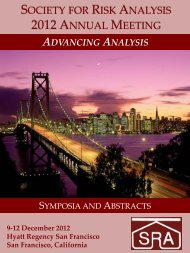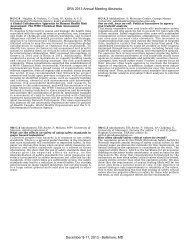years. Some of the most prominent examples include the Salmonella Montevideooutbreak with black and red pepper in 2009, the Salmonella Saintpauloutbreak associated with jalapeno and serrano peppers in 2008, and the E.coli O157:H7 outbreak associated with spinach in 2006. The reasons <strong>for</strong> theincrease in apparent prevalence have so far remained unclear, and may reflectchanges in consumption habits, alterations in production systems including increasedimports to meet growing demands year-round, or other factors such asimproved surveillance. Agricultural production systems are subject to numerous,highly diverse contamination sources along the farm-to-table continuum.In the absence of effective bacterial inactivation steps prior to consumption,contamination at any production stage may pose a direct risk to consumers.Due to the complex and highly diverse nature of current production systems,effective risk mitigation requires multi-disciplinary collaboration between regulatoryagencies, relevant industries, academic partners and consumers. Thesession will begin with a discussion of risk assessments that evaluate the microbialrisks associated with fresh produce consumption. The session will thenaddress meteorological and landscape factors that could predict microbial contaminationon farm. This discussion will be followed by review of surveillancesampling by the Food and Drug Administration and its use to characterize andprevent import of contaminated spices. Next, current risk analysis, mitigation,and control strategies employed by the spice industry to minimize the microbialrisk will be presented. The session will conclude with an in-depth discussionof produce consumption patterns in the United States.M4-F Panel Discussion: Structuring Decision Processes to Manage<strong>Risk</strong>s<strong>Risk</strong> analysis provides structure <strong>for</strong> understanding risks and their relationto an array of regulations and outcomes. Actions that are taken to affect risksare the result not just of analysis but of a decision process. Practical decisionanalytic methods can be combined with risk analysis. When risks are ambiguous,a decision focus may help to identify opportunities to manage or evenexploit the nature of the problem. Technical aspects of risks <strong>for</strong>m a basis <strong>for</strong>alternative generation. In some cases, axioms of rationality are appropriate anduseful guidance. Yet risk-oriented decision processes must account <strong>for</strong> a rangeof stakeholder concerns. Many of these process considerations depend on thetype of risk involved. This panel of practitioner-scholars experienced in bothrisk and decision analysis will discuss these and other issues.44M4-G Symposium: Assessing and Managing Carbon Nanomaterials<strong>Risk</strong>s: Current and Future ApproachesWith the continuing expansion of production and use of carbon nanomaterials,concerns regarding the potential health and environmental risks fromthese materials is also increasing. As with many of the nanomaterials currentlyin use and in development, there are significant challenges to assessing andmanaging the health and environmental risks that may be associated with thesematerials. This session will: 1) provide an overview of current research on thetoxicity of carbon nanomaterials; 2) discuss key issues in assessing the risk ofcarbon nanomaterials; and 3) present recent ef<strong>for</strong>ts and proposed approachesby governmental agencies and industry to assess and manage these risks.M4-H Symposium: Adversary Modeling <strong>for</strong> Terrorism <strong>Risk</strong> <strong>Analysis</strong>ApplicationsHomeland Security Presidential Directives (HSPD) -10, - 18, and -22, recognizethe need <strong>for</strong> systematic, science-based, terrorism risk assessments thatin<strong>for</strong>m strategic planning and resource prioritization. To address this need,the Department of Homeland Security (DHS) Science and Technology (S&T)Terrorism <strong>Risk</strong> Assessments (Bioterrorism <strong>Risk</strong> Assessment [BTRA]; ChemicalTerrorism <strong>Risk</strong> Assessment [CTRA]; Integrated Chemical, Biological, Radiologicaland Nuclear Terrorism <strong>Risk</strong> Assessment [ITRA]) were developed.The TRAs are comprehensive, probabilistic risk assessments that integrate theexpert judgments of the intelligence and law en<strong>for</strong>cement communities withthose from the scientific, medical, and public health communities. S&T is committedto continual improvement of the TRAs in support of decision makers.This panel showcases some of S&T’s recent investments in modeling the dynamicnature of an intelligent, adaptive adversary <strong>for</strong> risk analysis applications.The value of these and other approaches as a supplement or alternative toelicited static probabilities are being evaluated. The range of showcased approachesrepresents improvements to traditional probabilistic risk assessmentas well as application of novel and existing methodologies to the problem.M4-I Symposium: Synthesizing Studies <strong>for</strong> Evidence-Based Decisionmaking:Part 2, Expert Elicitation<strong>Risk</strong> analysts often require estimates of quantities that cannot be easilyderived from the available research, due to data gaps, conflicting or inconsistentresults, or other sources of uncertainty. In Part 1 of this symposium,we considered cross-disciplinary methodological advances in the use of metaregressionand other statistical methods to combine data across studies. In
Part 2, we consider the use of expert elicitation, which is a rigorous, structuredprocess <strong>for</strong> characterizing what is known about a quantity by eliciting experts’subjective probability distributions <strong>for</strong> the quantity. This symposium considersmethodological innovations <strong>for</strong> addressing several related challenges, includinghow to most appropriately combine results across experts, how to use ordinaldata, how to encode varying terminology used to describe probabilities,and how to address probabilistic inversion.TUESDAYT2-B Symposium: Seafood Safety Following the Deepwater HorizonOil SpillSince the Deepwater Horizon accident and oil spill in the Gulf of Mexicoof April of 2010, a number of ambitious post-spill scientific studies havebeen undertaken, including large-scale studies of seafood wholesomenessand safety <strong>for</strong> human consumption. The most-widely recognized of thosestudies have been conducted by the U.S. Food and Drug Administration(FDA), the National Oceanic and Atmospheric Administration (NOAA),and government agencies from the states that border the Gulf of Mexico.To assure scientific integrity of the overall assessment of seafood safety andto meet public demand, those sampling and testing programs will continue<strong>for</strong> the <strong>for</strong>eseeable future. In addition, substantial research has been undertakenby academic and other independent investigators, private parties, andpublic/environmental groups. This symposium will include presentations bysenior researchers from the University of Alabama (Birmingham),an internationalenvironmental advocacy group, U.S. FDA, NOAA, and state governmentsfrom the Gulf of Mexico region. Time permitting, the symposiumwill be concluded with an open panel discussion. T2-D Symposium: ClimateChange Impacts and Adaptation Strategies: Evolving Roles of <strong>Risk</strong> <strong>Analysis</strong>T2-D Symposium: Climate Change Impacts and Adaptation Strategies:Evolving Roles of <strong>Risk</strong> <strong>Analysis</strong>Climate adaptation is emerging as a critical mechanism by current policycan help human and natural systems can better adjust to a changing climate.Adaptation ef<strong>for</strong>ts in the United States are being conducted at multiple Governmentallevels and by both public and private organizations. Because ofthe inherent uncertainty in both long-range societal projections and regional-scaleclimate projections, risk analysis will play an important and growingrole in developing climate adaptation strategies at all levels. This symposiumwill bring together leading scientists from the US Geological Survey withexpertise on climate change impacts, who will describe cutting edge researchon regional climate impacts with special reference to effects on the coastalmargin. US Government officials will describe current Federal adaptationpolicies, and a risk assessment professional will consider how risk analysiscan contribute to better decision making in the light of this in<strong>for</strong>mation. Dr.Virginia Burkett, Chief Scientist <strong>for</strong> Global Change Research at the USGS,will describe regional climate change impacts using the latest available regionalmodeling data. Dr. Nathaniel Plant, Oceanographer with USGS, willdiscuss the use of Bayesian methods to derive estimate of coastal erosionas a function of sea level rise, local geology, and wave action that generatesimproved estimates of coastal erosion and hence climate impacts. ArthurRypinski, US DOT economist, and Ralph Cantral, geographer and SeniorCoordinator <strong>for</strong> the National Climate Assessment, will discuss the currentclimate adaptation and assessment ef<strong>for</strong>ts, in the light of the in<strong>for</strong>mationpresented by the scientists. Dr. Margaret MacDonell, Cumulative <strong>Risk</strong> <strong>Program</strong>Manager at Argonne National Laboratory, will survey current risk assessmentpractices in US adaptation ef<strong>for</strong>ts, and discuss potential improvementsin the current state of practice.T2-I Symposium: Regulation and <strong>Risk</strong>The four papers in this session illustrate a variety of issues involved in theregulation of risk and the treatment of risk in regulatory analysis. Presenterswill discuss the role of science in regulatory decisionmaking, the efficacy ofregulation when the nature of the regulated risks change, incorporation ofuncertainty analysis into environmental benefit estimation, and recent trendsin the assessment of uncertainty in regualtory impact analysis.T3-C Symposium: Improving Problem Formulation and Dose-ResponseBeyond Science and Decision, Part 1Under the Alliance <strong>for</strong> <strong>Risk</strong> Assessment (ARA), a series of public workshopsled by an Expert Panel of toxicologists and risk assessors were heldin 2010 and 2011 to continue the discussion on elements of risk assessmentset <strong>for</strong>th by the 2009 NRC report “Science and Decisions: Advancement of<strong>Risk</strong> Assessment.” This ARA activity was supported by 45 entities, includinggovernment agencies, industry groups, scientific societies, non-profit organizations/consortia,and consulting groups. The first ARA workshop explored avariety of perspectives on issues raised by the NAS 2009 report and discussedpossible case studies to address these. Representative case studies were thendeveloped and evaluated during the second ARA workshop. In the third ARA45
- Page 4 and 5: Ballroom C1Monday10:30 AM-NoonM2-A
- Page 9 and 10: US Environmental Protection Agency
- Page 11 and 12: Workshops - Sunday, December 4Full
- Page 13 and 14: WK9: Eliciting Judgments to Inform
- Page 15 and 16: These freely available tools apply
- Page 17 and 18: Plenary SessionsAll Plenary Session
- Page 19 and 20: 10:30 AM-NoonRoom 8/9M2-F Panel Dis
- Page 21 and 22: 1:30-3:00 PMRoom 8/9M3-F Symposium:
- Page 23 and 24: 4:50 pm M4-E.5Modeling of landscape
- Page 25 and 26: P.35 Health risk assessment of meta
- Page 27 and 28: Works-In-ProgressP.99 Assessing the
- Page 29 and 30: 10:30 AM-NoonRoom 8/9T2-F Error in
- Page 31 and 32: 1:30-3:00 PMRoom 8/9T3-F AppliedMet
- Page 34 and 35: 8:30-10:00 AMBallroom C1W1-A Sympos
- Page 36 and 37: 10:30 AM-NoonBallroom C1W2-A Commun
- Page 38: 1:30-3:00 PMBallroom C1W3-A Communi
- Page 41 and 42: 3:30-4:30 PMRoom 8/9W4-F Environmen
- Page 43 and 44: oth recent advances, and ongoing ch
- Page 45: M3-H Symposium: Analyzing and Manag
- Page 49 and 50: T4-E Symposium: Food Safety Risk Pr
- Page 51 and 52: While integral to guiding the devel
- Page 53 and 54: have contributed to past difficulti
- Page 55 and 56: M2-C.1 Abraham IM, Henry S; abraham
- Page 58 and 59: serious accident of the Tokyo Elect
- Page 60 and 61: een found that independence assumpt
- Page 62 and 63: W4-I.1 Beach RH, McCarl BA, Ohrel S
- Page 64 and 65: M4-A.1 Berube DM; dmberube@ncsu.edu
- Page 66 and 67: W4-A.1 Boerner FU, Jardine C, Dried
- Page 69 and 70: M2-G.1 Brink SA, Davidson RA; rdavi
- Page 71 and 72: M4-H.5 Buede DM, Ezell BC, Guikema
- Page 73 and 74: same scientists’ environmental he
- Page 75 and 76: periods of time. Successful adaptat
- Page 77 and 78: P.123 Charnley G, Melnikov F, Beck
- Page 79 and 80: derived from mouse and rat testes t
- Page 81 and 82: esources under any circumstance in
- Page 83 and 84: W4-B.3 Convertino M, Collier ZA, Va
- Page 85 and 86: addition, over 10% thought that eve
- Page 87 and 88: Reference Dose (RfD). The average e
- Page 89 and 90: W2-H.2 Demuth JL, Morss RE, Morrow
- Page 91 and 92: T4-H.4 Dingus CA, McMillan NJ, Born
- Page 93 and 94: methods research priorities and pot
- Page 95 and 96: W3-A.2 Eggers SL, Thorne SL, Sousa
- Page 97 and 98:
tions) were < 1 for sub-populations
- Page 99 and 100:
sociated with model error. Second,
- Page 101 and 102:
inter-donation interval to mitigate
- Page 103 and 104:
Fukushima nuclear accident coverage
- Page 105 and 106:
for growth inhibitor use and retail
- Page 107 and 108:
W1-C.1 Goble R, Hattis D; rgoble@cl
- Page 109 and 110:
stakeholders. The utility of this m
- Page 111 and 112:
T2-E.4 Guidotti TL; tee.guidotti@gm
- Page 113 and 114:
M4-C.2 Haines DA, Murray JL, Donald
- Page 115 and 116:
providing normative information of
- Page 117 and 118:
then allow both systems to operate
- Page 119 and 120:
tious disease outbreaks. Several cl
- Page 121 and 122:
P.122 Hosseinali Mirza V, de Marcel
- Page 123 and 124:
W2-B.1 Isukapalli SS, Brinkerhoff C
- Page 125 and 126:
M3-G.3 Jardine CG, Driedger SM, Fur
- Page 127 and 128:
P.88 Johnson BB, Cuite C, Hallman W
- Page 129 and 130:
metrics to provide risk management
- Page 131 and 132:
M4-C.1 Koch HM, Angerer J; koch@ipa
- Page 133 and 134:
certainty factors) and comparative
- Page 135 and 136:
T3-D.4 LaRocca S, Guikema SD, Cole
- Page 137 and 138:
P.71 Lemus-Martinez C, Lemyre L, Pi
- Page 139 and 140:
of excretion, and the increased che
- Page 141 and 142:
M2-D.4 MacKenzie CA, Barker K; cmac
- Page 143 and 144:
isk appetite and optimal risk mitig
- Page 145 and 146:
ameters, and enabled a more robust
- Page 147 and 148:
over the nature and format of infor
- Page 149 and 150:
Analysis (PRA). Existing parametric
- Page 151 and 152:
explosion of a bomb in a building,
- Page 153 and 154:
T3-G.3 Nascarella MA; mnascarella@g
- Page 155 and 156:
corresponding slowdown in container
- Page 157 and 158:
ing the scope and usage of the cybe
- Page 159 and 160:
dose for a variety of exposure scen
- Page 161 and 162:
“nanofibers”) is relatively und
- Page 163 and 164:
ment (CEA), which provides both a f
- Page 165 and 166:
T3-D.2 Resurreccion JZ, Santos JR;
- Page 167 and 168:
shore wind turbines have yet been b
- Page 169 and 170:
T2-D.3 Rypinski AD, Cantral R; Arth
- Page 171 and 172:
time and temperature, determining t
- Page 173 and 174:
esponse to requests from the EC, th
- Page 175 and 176:
ers and inspectors. Analysis examin
- Page 177 and 178:
smoked salmon, and associated expos
- Page 179 and 180:
and 95th percentiles). Increasing t
- Page 181 and 182:
esponse relationship for B. anthrac
- Page 183 and 184:
variation on Day 0. Results showed
- Page 185 and 186:
sidered. The most significant resul
- Page 187 and 188:
lived in a apartment (not including
- Page 189 and 190:
W3-C.4 von Stackelberg KE; kvon@eri
- Page 191 and 192:
P.12 Waller RR, Dinis MF; rw@protec
- Page 193 and 194:
W2-B.6 Wang D, Collier Z, Mitchell-
- Page 195 and 196:
iomonitoring “equivalent” level
- Page 197 and 198:
T4-H.2 Winkel D, Good K, VonNiederh
- Page 199 and 200:
mation insufficiency, risk percepti
- Page 201 and 202:
choices. This work examines these s
- Page 203 and 204:
sults and possible intended or unin
- Page 205 and 206:
AAbadin HG.................... 36,
- Page 207 and 208:
Gray GM............................
- Page 209 and 210:
Peters E...........................
- Page 211 and 212:
SECOND FLOOR Floor MapConvention Ce


